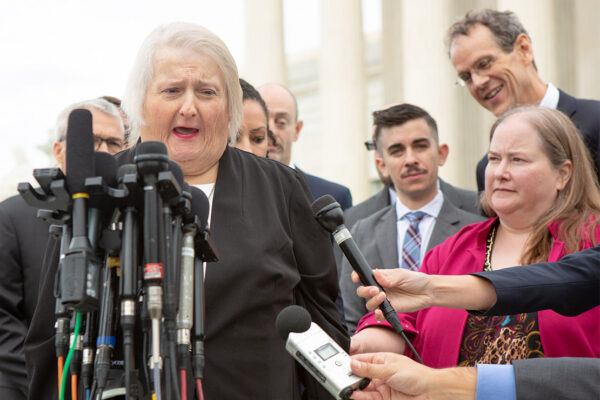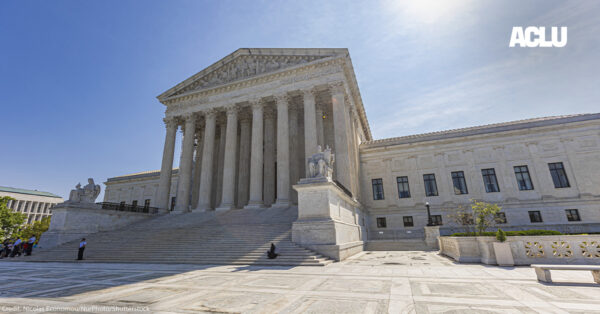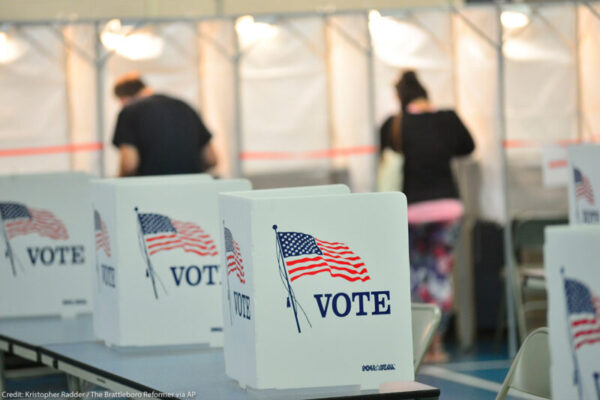Michigan
O’Connor-Ratcliff v. Garnier and Lindke v. Freed
The ACLU, the ACLU of Northern California, and the ACLU of Southern California filed amicus briefs in support of everyday people fighting for government transparency and accountability in two cases set for review by the U.S. Supreme Court this Term: O’Connor-Ratcliff v. Garnier and Lindke v. Freed.
Status: Ongoing
View Case
Visit ACLU of Michigan Featured
U.S. Supreme Court
Jun 2020

LGBTQ Rights
R.G. & G.R. Harris Funeral Homes v EEOC & Aimee Stephens
Aimee Stephens had worked for nearly six years as a funeral director at R.G. and G.R. Harris Funeral Homes when she informed the funeral home’s owner that she is a transgender woman. She was fired, the EEOC sued on her behalf, and the Sixth Circuit Court of Appeals ruled that Aimee’s employer engaged in unlawful sex discrimination when it fired her because she’s transgender. We represented Aimee Stephens in front of the U.S. Supreme Court — and won.
Stay informed about our latest work in the courts.
By completing this form, I agree to receive occasional emails per the terms of the ACLU's privacy statement.
All Cases
28 Michigan Cases

U.S. Supreme Court
Jan 2025
Prisoners' Rights
Perttu v Richards
The Seventh Amendment gives people a constitutional right to a jury trial in civil cases seeking money damages. The Supreme Court will now decide whether incarcerated plaintiffs have a right to a jury trial on questions of administrative exhaustion under the Prison Litigation Reform Act, when the facts underlying exhaustion would also decide the merits of their case.
Explore case
U.S. Supreme Court
Jan 2025

Prisoners' Rights
Perttu v Richards
The Seventh Amendment gives people a constitutional right to a jury trial in civil cases seeking money damages. The Supreme Court will now decide whether incarcerated plaintiffs have a right to a jury trial on questions of administrative exhaustion under the Prison Litigation Reform Act, when the facts underlying exhaustion would also decide the merits of their case.

Michigan
Dec 2024
Privacy & Technology
Woodruff v. Oliver
On December 5, 2024, the ACLU and the ACLU of Michigan filed an amicus brief in Woodruff v. Oliver, a wrongful arrest lawsuit in the United States District Court for the Eastern District of Michigan, arguing that the Detroit Police Department’s (DPD) reliance on flawed facial recognition technology (FRT) impermissibly tainted the investigation and failed to establish probable cause for the plaintiff’s arrest.
Explore case
Michigan
Dec 2024

Privacy & Technology
Woodruff v. Oliver
On December 5, 2024, the ACLU and the ACLU of Michigan filed an amicus brief in Woodruff v. Oliver, a wrongful arrest lawsuit in the United States District Court for the Eastern District of Michigan, arguing that the Detroit Police Department’s (DPD) reliance on flawed facial recognition technology (FRT) impermissibly tainted the investigation and failed to establish probable cause for the plaintiff’s arrest.

Michigan Supreme Court
Oct 2024
Immigrants' Rights
Michigan Immigrant Rights Center v. Gretchen Whitmer
For state constitutional rights to be meaningful, they have to be enforceable by courts. This case will affect whether people can sue government officials in state court to stop the violation of their constitutional rights.
Explore case
Michigan Supreme Court
Oct 2024

Immigrants' Rights
Michigan Immigrant Rights Center v. Gretchen Whitmer
For state constitutional rights to be meaningful, they have to be enforceable by courts. This case will affect whether people can sue government officials in state court to stop the violation of their constitutional rights.

U.S. Supreme Court
Sep 2024
Criminal Law Reform
Racial Justice
Carpenter v. United States
This case concerns the First Step Act of 2018, in which Congress made major reductions to the mandatory minimum sentences for certain federal drug and firearm offenses. These changes result in sentences many decades shorter than were required under the previous laws. The question in this case was whether people who were initially sentenced prior to enactment of the First Step Act, but whose sentences were vacated and remanded for resentencing after enactment of the law, can benefit from its major reductions in applicable mandatory minimums. For defendants like Mr. Carpenter, who was originally sentenced to a draconian 116 years in prison as a result of the pre-First Step Act mandatory minimums, applying the First Step Act can mean the difference between dying in prison and having the opportunity to eventually go free. Unfortunately, although there is a split among federal courts of appeals on this question, the Supreme Court denied cert in this case in February 2024.
Explore case
U.S. Supreme Court
Sep 2024

Criminal Law Reform
Racial Justice
Carpenter v. United States
This case concerns the First Step Act of 2018, in which Congress made major reductions to the mandatory minimum sentences for certain federal drug and firearm offenses. These changes result in sentences many decades shorter than were required under the previous laws. The question in this case was whether people who were initially sentenced prior to enactment of the First Step Act, but whose sentences were vacated and remanded for resentencing after enactment of the law, can benefit from its major reductions in applicable mandatory minimums. For defendants like Mr. Carpenter, who was originally sentenced to a draconian 116 years in prison as a result of the pre-First Step Act mandatory minimums, applying the First Step Act can mean the difference between dying in prison and having the opportunity to eventually go free. Unfortunately, although there is a split among federal courts of appeals on this question, the Supreme Court denied cert in this case in February 2024.

Michigan
Sep 2024
Voting Rights
ACLU of Michigan v. Froman
Michigan requires boards of county canvassers to certify the results of an election within 14 days after the election based on the total number of votes reported from each location. The law doesn't allow them to withhold certification. Kalamazoo Board of County Canvassers member, Robert Froman, has made clear that he would decline to certify the November 2024 election under certain circumstances. This lawsuit asks the state's courts to make clear that Mr. Froman is duty bound to certify the election based on the number of votes reported.
Explore case
Michigan
Sep 2024

Voting Rights
ACLU of Michigan v. Froman
Michigan requires boards of county canvassers to certify the results of an election within 14 days after the election based on the total number of votes reported from each location. The law doesn't allow them to withhold certification. Kalamazoo Board of County Canvassers member, Robert Froman, has made clear that he would decline to certify the November 2024 election under certain circumstances. This lawsuit asks the state's courts to make clear that Mr. Froman is duty bound to certify the election based on the number of votes reported.
